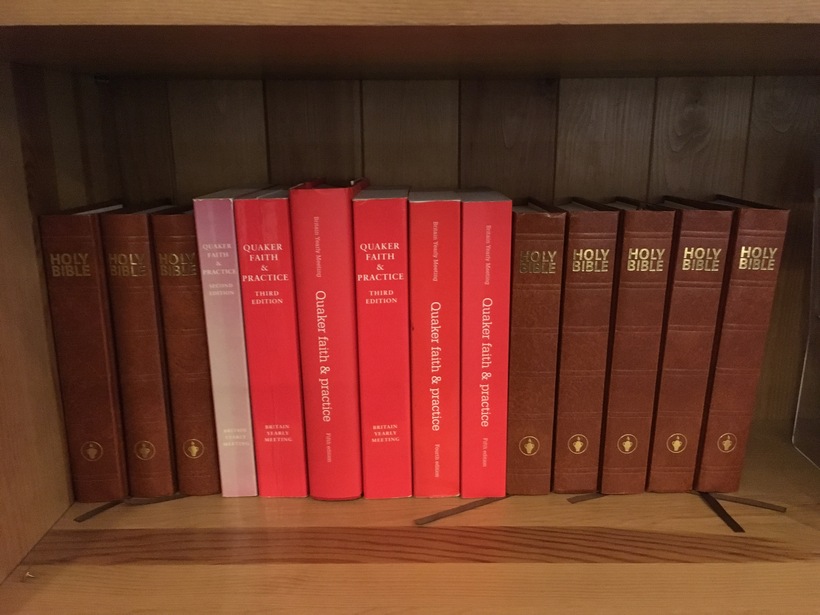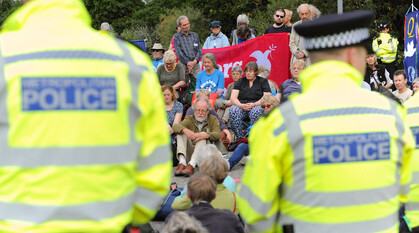Love Your Neighbour, but struggle with Scripture?
Rhiannon discusses the meanings behind this year's Quaker Week theme and explores how different Quakers might think about its Biblical origins.

This year's theme for World Quaker Day and Quaker Week is 'Love Your Neighbour'. It's a positive and caring message, and not exclusively a religious one. Most people of all faiths and none would agree that it's a good idea, even if it does raise the question posed to Jesus in Luke 10:29: “And who is my neighbour?"
It's a quote straight from the Bible. It appears in Leviticus 19, then Jesus quotes it in several places in the Gospels, and his followers include it in their letters. This makes it a useful theme. It forms a point of connection with others who use the Bible.
It also makes it recognisably religious and lets people not familiar with Quakers know that we are a faith community, without pushing a theological idea with which it's difficult for others to agree. Biblical teaching can carry a certain authority, of being time-tested and wise, even to people who aren't religious or belong to a religion which doesn't directly relate to the Biblical text.
It could also make this theme uncomfortable. Within the Quaker community in Britain, there are a wide range of perspectives on the Bible: people who love it for the mystical inspiration it provides, people who love the moral teachings but struggle with the supernatural elements of the stories, people who like some bits and not others, people who learn a lot from engaging with the difficult as well as the approachable parts, people who don't want anything to do it with, people to whom it simply seems irrelevant, and more. If you are one of the people who finds the Bible hard to relate to for whatever reason, what can you make of this Quaker Week theme?
Sharing our different perspectives
It's important to accept that this complexity is normal and authentic for us. Events like World Quaker Day ask us to come together as a worldwide family and to share our perspectives with people outside the Quaker community, but they don't ask us to change or tell anything other than the truth about who we are. We can love and care for our diversity.
If we find Biblical quotes hard, if they bring up bad memories or raise difficult questions, we can be tender and loving in acknowledging that about ourselves. Sometimes Christian teachings about love get twisted round to create harm and hatred.For people who have suffered in that way self-care and support from the community can both be powerful.
Layers of meaning
“Love your neighbour" is often quoted alone – it does make a snappy theme – but it might be useful to put it back into the context of the passages of the Bible in which it occurs. Doing this can bring out different layers of meaning and find those which seem relevant today.
For example, if someone wants Biblical authority about community love and caring for ourselves as well, it's there. Leviticus 19:18 says “You shall not take vengeance or bear a grudge against any of your people, but you shall love your neighbour as yourself: I am the Lord." (NRSV)
In the Gospel of Luke, 10:25-37, Jesus is asked about the meaning of this teaching and he explains who counts as a neighbour through the parable of the Good Samaritan. In that story, the person who is a good neighbour is the one who shows mercy and gives direct practical help to someone who is suffering. By teaching through a story, Jesus opens up possibilities rather than giving a single clear answer.
In Symon Hill's reflections on the Good Samaritan in his book The upside-down Bible, he covers ways in which this can be an anti-racist story, oppose violence, and point to the importance of hospitality and interdependence. There are undoubtedly many more ways to think about it and some might speak to your condition more than others. If you want to start exploring this for yourself, a starting point would be to read the story in a modern translation and ask: which of these characters am I most like?
Putting Scripture into practice
Finally, we can celebrate the range of different responses to this theme which are present and welcome in the British Quaker community. Our diversity is a strength. Asking challenging questions about Biblical texts can be an opportunity to see other perspectives – being challenged on the meaning of Scripture gave Jesus the opening to share the Good Samaritan parable, and in listening to one another we can find lots of other insights arising.
Being a diverse community also gives each of us space to change our minds, to grow and develop. Together with many other people who are each doing their best to love their neighbours, we can all learn new ways of putting this into practice.


